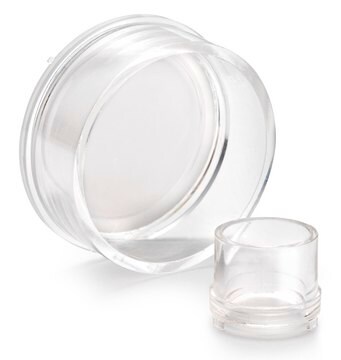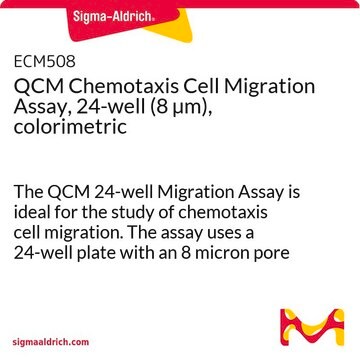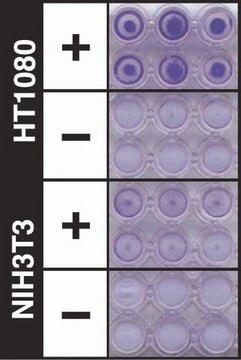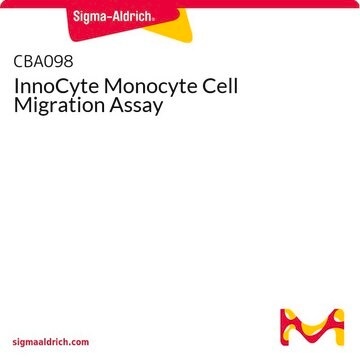ECM506
QCM Chemotaxis Cell Migration Assay, 24-well (5 µm), colorimetric
This 3 um QCM Chemotaxis Assay 24-well plate -colorimetric is performed in a Migration Chamber, based on the Boyden chamber principle.
동의어(들):
Cell migration assay, Chemotaxis assay
로그인조직 및 계약 가격 보기
모든 사진(1)
About This Item
UNSPSC 코드:
12352207
eCl@ss:
32161000
NACRES:
NA.84
가격 및 재고 정보를 현재 이용할 수 없음
추천 제품
Quality Level
종 반응성(상동성에 의해 예측)
all
제조업체/상표
Chemicon®
QCM
기술
activity assay: suitable
cell based assay: suitable
검출 방법
colorimetric
배송 상태
wet ice
일반 설명
Also available: Cell Comb Scratch Assay! Get biochemical data from a scratch assay!Click Here
Introduction
Cell migration is a fundamental function of normal cellular processes, including embryonic development, angiogenesis, wound healing, immune response, and inflammation (1, 2). Most cells are sized from 30 to 50 µm can migrate through 3 to 10 µm pore. Microporous membrane inserts are widely used for cell migration and invasion assays. The most widely accepted of which is the Boyden Chamber assay. The Boyden Chamber system uses a hollow plastic chamber, sealed at one end with a porous membrane. This chamber is suspended over a larger well which may contain medium and/or chemoattractants. Cells are placed inside the Chamber and allowed to migrate through the pores, to the other side of the membrane. Migratory cells are then stained and counted. Most migration assays utilize an 8 µm pore size, as this is appropriate for most cell types, e.g. epithelial and fibroblast cells. The Millipore 5 µm QCM Chemotaxis Assay 24-well- colorimetric utilizes a 5 µm pore size, which is appropriate for a subset of fibroblast cells or cancer cells such as NIH-3T3 and MDA-MAB 231 cells. Cells migrated toward chemoattractants were measured by crystal violet, a nucleic dye, and quantified by spectrophotometers. The system may be adapted to study different types of cell migration, including haptotaxis, random migration, and chemokinesis.
The Millipore QCM 5 µm Chemotaxis Assay 24-well-colorimetric provides a quick and efficient system for quantitative determination of various factors on cell migration, including screening of pharmacological agents, evaluation of integrins or other adhesion receptors responsible for cell migration, or analysis of gene function in transfected cells.
In addition, Chemicon continues to provide numerous migration, invasion, and adhesion products including:
• QCM 8µm 24-well Chemotaxis Cell Migration Assays (ECM508, 509)
• QCM 5µm 24-well Chemotaxis Cell Migration Assay- Fluorometric (ECM507)
• QCM 8µm 96-well Chemotaxis Cell Migration Assay (ECM510)
• QCM 5µm 96-well Chemotaxis Cell Migration Assay (ECM512)
• QCM 3µm 96-well Chemotaxis Cell Migration Assay (ECM515)
• QCM 96-well ECMatrix Cell Invasion Assay (ECM555)
• QCM 96-well Collagen-based Cell Invasion Assay (ECM556)
Introduction
Cell migration is a fundamental function of normal cellular processes, including embryonic development, angiogenesis, wound healing, immune response, and inflammation (1, 2). Most cells are sized from 30 to 50 µm can migrate through 3 to 10 µm pore. Microporous membrane inserts are widely used for cell migration and invasion assays. The most widely accepted of which is the Boyden Chamber assay. The Boyden Chamber system uses a hollow plastic chamber, sealed at one end with a porous membrane. This chamber is suspended over a larger well which may contain medium and/or chemoattractants. Cells are placed inside the Chamber and allowed to migrate through the pores, to the other side of the membrane. Migratory cells are then stained and counted. Most migration assays utilize an 8 µm pore size, as this is appropriate for most cell types, e.g. epithelial and fibroblast cells. The Millipore 5 µm QCM Chemotaxis Assay 24-well- colorimetric utilizes a 5 µm pore size, which is appropriate for a subset of fibroblast cells or cancer cells such as NIH-3T3 and MDA-MAB 231 cells. Cells migrated toward chemoattractants were measured by crystal violet, a nucleic dye, and quantified by spectrophotometers. The system may be adapted to study different types of cell migration, including haptotaxis, random migration, and chemokinesis.
The Millipore QCM 5 µm Chemotaxis Assay 24-well-colorimetric provides a quick and efficient system for quantitative determination of various factors on cell migration, including screening of pharmacological agents, evaluation of integrins or other adhesion receptors responsible for cell migration, or analysis of gene function in transfected cells.
In addition, Chemicon continues to provide numerous migration, invasion, and adhesion products including:
• QCM 8µm 24-well Chemotaxis Cell Migration Assays (ECM508, 509)
• QCM 5µm 24-well Chemotaxis Cell Migration Assay- Fluorometric (ECM507)
• QCM 8µm 96-well Chemotaxis Cell Migration Assay (ECM510)
• QCM 5µm 96-well Chemotaxis Cell Migration Assay (ECM512)
• QCM 3µm 96-well Chemotaxis Cell Migration Assay (ECM515)
• QCM 96-well ECMatrix Cell Invasion Assay (ECM555)
• QCM 96-well Collagen-based Cell Invasion Assay (ECM556)
애플리케이션
The Millipore 5 µm QCM Chemotaxis Assay 24-well-colorimetric is performed in a Migration Chamber, based on the Boyden chamber principle. The 5 µm pore size of this assay′s Boyden chambers is appropriate for studying a subset of fibroblast or cancer cell migration. The quantitative nature of this assay is useful for screening of pharmacological agents. Each kit provides sufficient materials for the evaluation of 24 samples.
The Millipore 5 µm QCM Chemotaxis Assay 24-well-colorimetric is intended for research use only; not for diagnostic applications.
The Millipore 5 µm QCM Chemotaxis Assay 24-well-colorimetric is intended for research use only; not for diagnostic applications.
포장
24 wells
성분
Sterile 5 µm 24-well Cell Migration Plate Assembly: (Part No. 2005708) Two 24-well plates with 12 inserts per plate (24 inserts total/kit).
Cell Stain: (Part No. 90144) one 20 ml.
Extraction buffer: (Part No. 90145) one 20ml.
Cotton Swaps: (Part No. 10202) 50 each.
Forceps: (Part No. 10203) One each.
Cell Stain: (Part No. 90144) one 20 ml.
Extraction buffer: (Part No. 90145) one 20ml.
Cotton Swaps: (Part No. 10202) 50 each.
Forceps: (Part No. 10203) One each.
저장 및 안정성
The 5 µm 24-well Cell Migration Plate and forceps are stored at room temperature. Cell stain and extraction buffer can be store at 2° to 8°C up to the expiration date. Do not freeze any components.
법적 정보
Accutase is a registered trademark of Innovative Cell Technologies, Inc.
CHEMICON is a registered trademark of Merck KGaA, Darmstadt, Germany
면책조항
Unless otherwise stated in our catalog or other company documentation accompanying the product(s), our products are intended for research use only and are not to be used for any other purpose, which includes but is not limited to, unauthorized commercial uses, in vitro diagnostic uses, ex vivo or in vivo therapeutic uses or any type of consumption or application to humans or animals.
신호어
Danger
유해 및 위험 성명서
Hazard Classifications
Eye Irrit. 2 - Flam. Liq. 2
Storage Class Code
3 - Flammable liquids
Flash Point (°F)
53.6 °F
Flash Point (°C)
12 °C
시험 성적서(COA)
제품의 로트/배치 번호를 입력하여 시험 성적서(COA)을 검색하십시오. 로트 및 배치 번호는 제품 라벨에 있는 ‘로트’ 또는 ‘배치’라는 용어 뒤에서 찾을 수 있습니다.
이미 열람한 고객
Arash Aghajani Nargesi et al.
American journal of physiology. Renal physiology, 317(5), F1142-F1153 (2019-08-29)
Scattered tubular-like cells (STCs) contribute to repair neighboring injured renal tubular cells. Mitochondria mediate STC biology and function but might be injured by the ambient milieu. We hypothesized that the microenviroment induced by the ischemic and metabolic components of renovascular
Dola Das et al.
Fibrogenesis & tissue repair, 7, 9-9 (2014-06-12)
C5a and its cognate receptor, C5a receptor (C5aR), key elements of complement, are critical modulators of liver immunity and fibrosis. However, the molecular mechanism for the cross talk between complement and liver fibrosis is not well understood. C5a is a
Christopher M Ferguson et al.
Cells, 10(4) (2021-04-04)
Percutaneous transluminal renal angioplasty (PTRA) confers clinical and mortality benefits in select 'high-risk' patients with renovascular disease (RVD). Intra-renal-delivered extracellular vesicles (EVs) released from mesenchymal stem/stromal cells (MSCs) protect the kidney in experimental RVD, but have not been compared side-by-side
Tatsuya Hasegawa et al.
Scientific reports, 11(1), 2613-2613 (2021-01-30)
Apical periodontitis (AP) is an acute or chronic inflammatory disease caused by complex interactions between infected root canal and host immune system. It results in the induction of inflammatory mediators such as chemokines and cytokines leading to periapical tissue destruction.
Alfonso Eirin et al.
Stem cell research, 47, 101877-101877 (2020-06-28)
Mesenchymal stromal/stem cell (MSC)-derived extracellular vesicles (EVs) shuttle select MSC contents and are endowed with an ability to repair ischemic tissues. We hypothesized that exposure to cardiovascular risk factors may alter the microRNA cargo of MSC-derived EVs, blunting their capacity
자사의 과학자팀은 생명 과학, 재료 과학, 화학 합성, 크로마토그래피, 분석 및 기타 많은 영역을 포함한 모든 과학 분야에 경험이 있습니다..
고객지원팀으로 연락바랍니다.









